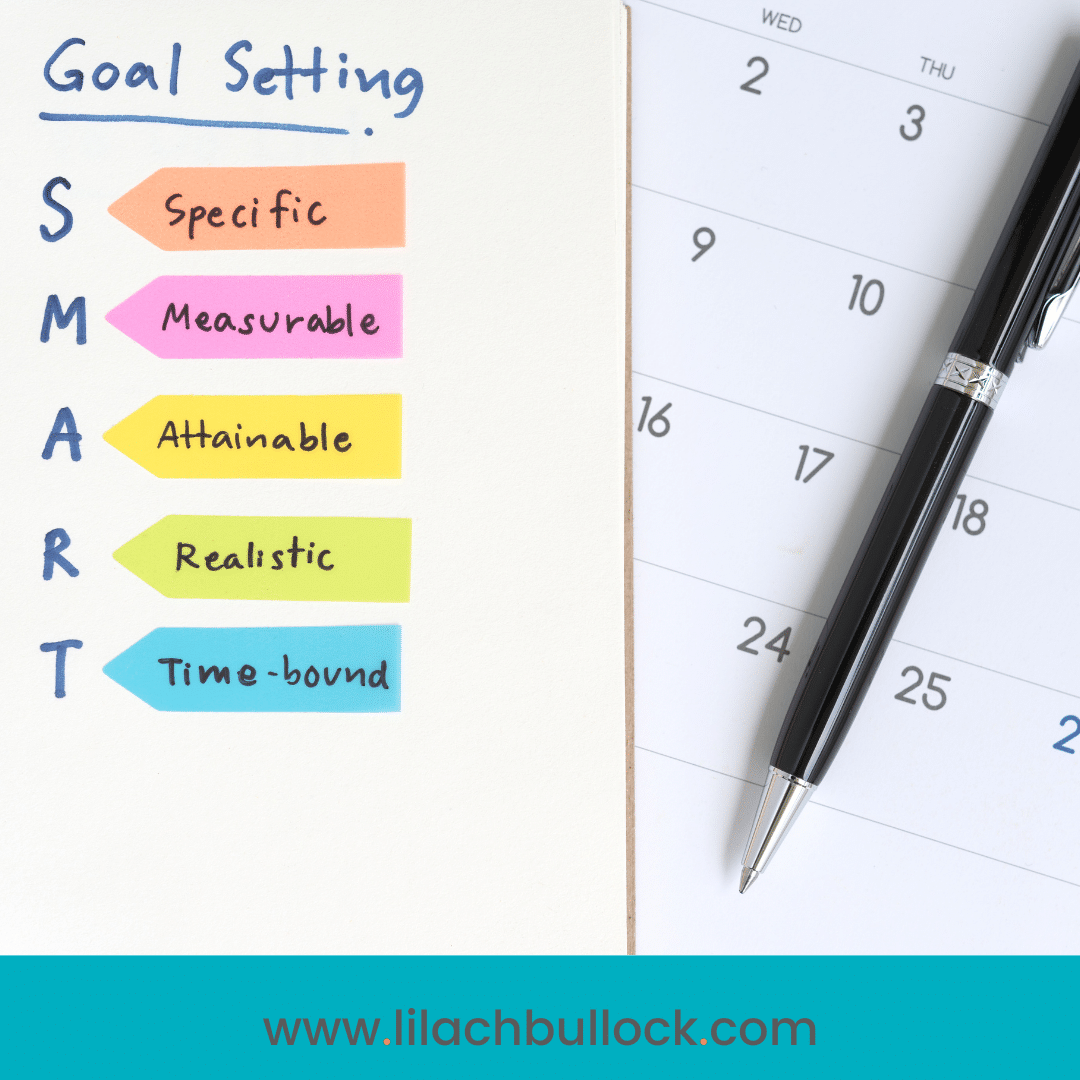Follow Lilach
What are SMART goals: a complete guide to setting SMART goals for achieving success
When talking about goals and goal-setting, it’s impossible not to mention SMART goals.
It’s arguably the most popular goal-setting method and for good reason: SMART goals can be used in numerous situations and for numerous reasons, whether they have to do with your very own personal development and life goals or whether they have to do with your work or your career.
But in order to get the most out of your goals, you need to not only understand the basics of setting SMART goals, but how to leverage them to their full potential so that you can actually reach all of your goals.
And that is exactly what I want to show you in this complete guide to SMART goals: not just what they are but how to leverage them to help push you harder and faster towards achieving your biggest dreams.
What are SMART goals?

SMART goals are types of goals set using specific parameters; SMART is an acronym that stands for Specific, Measurable, Achievable, Relevant and Timely/Time-based. Using this framework, you can then set highly specific goals for yourself or for your work, by making sure that our goals are very clear and trackable.
S: Specific
In other words, your goal needs to be as clear and as specific as possible. This is because the more specific you are, the easier it is to identify the strategy you need to take in order to achieve your goal.
M: Measurable
Another very important part of a successful goal is whether you can measure your progress and results effectively. From a business/marketing standpoint, you’d set KPIs (key performance indicators) while for other, more personal goals, you can set different milestones to help you track your success.
A: Achievable
Another very important part of a successful goal is to make sure that it’s achievable within the timeframe you set. This is an important part because when you set goals that are too difficult to achieve by your deadline, it will only serve to demotivate you.
R: Relevant
How relevant is your goal to your overall objectives? As you set goals for yourself – or for work – ask yourself, how does this goal tie in with your ultimate objectives? Does it help you get closer to reaching them? If not, you might want to rethink that goal.
T: Timely
Or, in other words, what is the deadline for your goal? It’s important to have a clear timeframe and deadline for your goals as this allows you to prioritize the steps you need to take, as well as give you the motivation you need to take these steps and achieve your goal in a timely manner.
Why are SMART goals important – and why choose this framework when setting goals for yourself?
At first glance, setting goals looks like such an easy task: you say you want to achieve this or that and well… that’s pretty much it.
Here’s a very simple example of a goal that I’m sure a lot of people have wanted to achieve at one point or another:
“I want to get fit”
The sentiment behind is great – but the goal itself does not set you up for success. Quite the opposite, in fact.
Getting fit is a vague concept, just like the goal itself. In fact, it’s a more of a dream than a goal.
And that’s bad for a few different reasons.
For one, it provides no real direction. You know you want to be fit, but you have no direction on how to achieve that.
And secondly, without this direction, without this purpose, it’s so much easier to de-motivate yourself when you don’t achieve what you want.
On the other hand, when you set highly specific goals for yourself, using the SMART framework, you’ll have a very clear direction so that you can build a plan to help you achieve your goal; here’s how setting SMART goals for yourself helps you actually achieve them:
- When you’re very specific about what you want to achieve, it’s much easier to plan the steps you need to take to help you reach your goals; in other words, a proper goal will give you better focus
- With a clear deadline and timeline for your goal, it’s easier to prioritize your tasks so that you can reach your goal in a timely manner
- Setting goals for yourself correctly can have huge motivational power: as you reach the milestones you set for yourself until you reach your goal, you’ll get more and more motivated to finish your task – and therefore, reach your goal
- Setting goals properly allows you to properly organize yourself, your time and your resources
How to set SMART goals for yourself: a step-by-step framework
Step 1: Look at the big picture
In order to be as specific as possible with your goals – so that you can actually achieve them – you first need to know what the big picture looks like and what your end goals are.
Based on that, you can then plan SMART goals for yourself that aren’t as broad but that ultimately get you closer towards reaching your end goals.
So, ask yourself this: where do you want to be in 5, 10, 15 years’ time? Or, if we’re talking about business – where do you want your business to be in the far future?
From a personal standpoint, these goals can be related to:
- Your career and what you want to achieve in your career; perhaps it’s growing into new roles or completely changing your career’s direction
- Physical goals, including weight and health
- Mental and attitude goals such as changing your mindset
- Financial goals, such as how much you earn or what you want to own at some point in life
- Personal goals, such as building a family and becoming a parent
Every person is different though and so are their priorities – so think of what is important to you, what you want to change in your life and set your goals based on that; the above is just a generalized view of the most popular types of areas people usually care about.
When you start brainstorming all of these goals, it’s important to take your time and really think about why you want to reach these goals – and is it something that you think you want now? Or something that you’ll still want 10 years later?
From a business standpoint, your end objectives could be:
- Financial goals, aka reaching a certain revenue or profit
- Entering a new market
- Expanding your business in new locations or new countries
Once you have this information written down and you know exactly what your end goals are, you can start setting SMART goals; after all, without this information, you won’t be able to establish whether your goals are relevant or not.
Step 2: Set your SMART goals
Once you’re clear on the big picture and the end goals you want to achieve, it’s time to start putting together your SMART goals: smaller, more manageable goals with shorter timeframes that you can get started with now.
Remember that your goals should:
- Specific – the clearer and the more specific you are, the better
- Measurable – make sure you’ll be able to measure your results, as well as be able to track your progress along the way
- Attainable – don’t set yourself up for failure – but don’t make it too easy on yourself either. Ensure that your goals are challenging enough but that at the same time, you can also definitely reach them in the timeframe you set for yourself
- Relevant – remember the big picture and your end goals and set goals for yourself that are relevant to the big picture
- Timely – ensure you have a clear deadline for your SMART goals so that you know exactly when to measure your goals’ success

Step 3: Create a plan and a to-do list and start prioritizing your actions

Now that you have your goal, it’s time to plan out how you’re going to reach it:
- Write down all of the steps you need to take to reach your goal
- Separate the steps and break them down into smaller tasks (a Kanban-style planning tool like Trello is really helpful with this)
- Prioritize your tasks: identify the tasks that you need to start with as well as the most important tasks in your to-do list so that you can start with the most important steps
Step 4: Set milestones and KPIs to track your goals

Setting milestones and KPIs (key performance indicators) for your goals is extremely important, for two big reasons:
- It allows you to track your success as you go along so that you can make changes to your strategy and direction, particularly if you’re not reaching your milestones in a timely manner (thus allowing you to also reach your end goal)
- It motivates you to keep going and actually achieve your objectives: when you see that your hard work and your strategy is paying off and you are indeed, closer to reaching your objective, that serves as a powerful motivator to keep going
Once you start working towards your goals, make sure you always take the time to track your progress so that you know:
- Whether you’re actually getting closer to reaching your goals
- Whether you’ve made any planning mistakes and need to revise your strategy
- Whether you’re in line with your goals’ set timeframe
Step 5: Measure your results

Once you reach your goals’ deadline, it’s time to measure your results. This is important for a number of reasons:
- The first and perhaps most obvious reason, is that this helps you understand whether you’ve reached your goal or not
- To understand what you should’ve done differently
- To identify what you did right and what you did wrong
- So that you can improve future SMART goals: monitoring your goals’ progress and success helps you understand more about how your work, how motivated you are and therefore, how to optimize future goals – from changing deadlines to making them less or more challenging
Conclusion: use SMART goals to improve your life, both personally and professionally
Setting goals for yourself and for your work can be an extremely powerful thing when done right – and there really is no better way than with SMART goals.
Use them correctly and you’ll be able to get more stuff done, motivate yourself, grow your inner-confidence and ultimately, achieve everything you’ve ever wanted to achieve.
To set quality SMART goals, follow the tips and steps outlined in this guide and start seeing the results you’ve always wanted to get.

Follow Lilach















